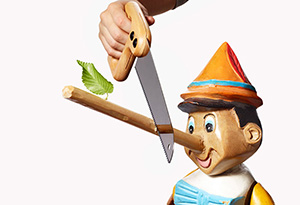Why People Lie: Investigating the Truth About Deception

Photo: Adam Voorhes
PAGE 2
Perhaps the most troubling finding of the study was that many of the subjects were unaware of how often they had lied until they watched videotapes of their conversations. "They were floored," Feldman says. That level of subconscious lying may be a harbinger of even bigger lies. When I asked Dan Ariely, PhD, professor of psychology and behavioral economics at Duke University and the author of The (Honest) Truth About Dishonesty, what separates harmless liars from the Lance Armstrongs of the world, he told me that ultimately it comes down to how people rationalize their dishonesty. Lies can wield the most power when we start to believe them. "In your case, you told the hot-air-balloon story purely out of vanity," Ariely says. "But imagine if you lied about being a Rhodes Scholar and then got a job based on that untruth. That's when things begin to escalate. What distinguishes the lies that tend to snowball out of control is due in large part to circumstance, not just the individual." But those circumstances are often predicated on a need to keep up the falsehood. Take, for example, the well-publicized case of former vice presidential candidate Paul Ryan, who claimed he ran a marathon in just under three hours, shaving more than an hour from his true time. By repeating the untruth over and over again, Ariely says, it may have become easier for Ryan to believe he was telling the truth.
At first I'm skeptical of this reasoning. If something never happened, how could anyone trick herself into believing it did? Ariely had an answer for this, too. In one of his experiments, people who cheated on a test were given certificates confirm-ing their dishonest scores. Over time the liars were more likely to believe that their exaggerated performance was an accurate reflection of their abilities. Getting confirmation, in this case in the form of certificates, can help make it easier to think of a lie as true. "Believing our lies is an incredibly important human capacity," Ariely says. "Without it, we risk living in terrible conflict all the time."
This helped explain why my guilt continued to gnaw at me so many years later. Unlike the testers, I had never taken part in the activity I lied about, nor was I ever in a situation to reinforce the falsehood.
While it was too late to come clean to my friend—we've since lost touch, and I'm sure she has long forgotten our conversation—I had to find a way to make peace with the lie. The simplest solution: finally taking a ride in a hot-air balloon. I found a local company on the Internet and was booked on a ride by the next weekend. Terrified of heights, I white-knuckled my way through the first agonizing minutes as the basket soared skyward. But somewhere over the emerald green hillside, I was overcome with a surprising sense of calm—the freeing feeling that comes when you've done the right thing. Now I had a true story to tell.
Sarah Jio is the author of four novels. Her most recent, The Last Camellia (Plume), was published in May.
More on Oprah.com
At first I'm skeptical of this reasoning. If something never happened, how could anyone trick herself into believing it did? Ariely had an answer for this, too. In one of his experiments, people who cheated on a test were given certificates confirm-ing their dishonest scores. Over time the liars were more likely to believe that their exaggerated performance was an accurate reflection of their abilities. Getting confirmation, in this case in the form of certificates, can help make it easier to think of a lie as true. "Believing our lies is an incredibly important human capacity," Ariely says. "Without it, we risk living in terrible conflict all the time."
This helped explain why my guilt continued to gnaw at me so many years later. Unlike the testers, I had never taken part in the activity I lied about, nor was I ever in a situation to reinforce the falsehood.
While it was too late to come clean to my friend—we've since lost touch, and I'm sure she has long forgotten our conversation—I had to find a way to make peace with the lie. The simplest solution: finally taking a ride in a hot-air balloon. I found a local company on the Internet and was booked on a ride by the next weekend. Terrified of heights, I white-knuckled my way through the first agonizing minutes as the basket soared skyward. But somewhere over the emerald green hillside, I was overcome with a surprising sense of calm—the freeing feeling that comes when you've done the right thing. Now I had a true story to tell.
Sarah Jio is the author of four novels. Her most recent, The Last Camellia (Plume), was published in May.
More on Oprah.com



